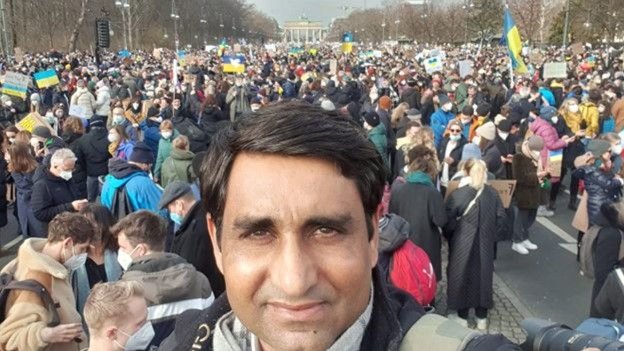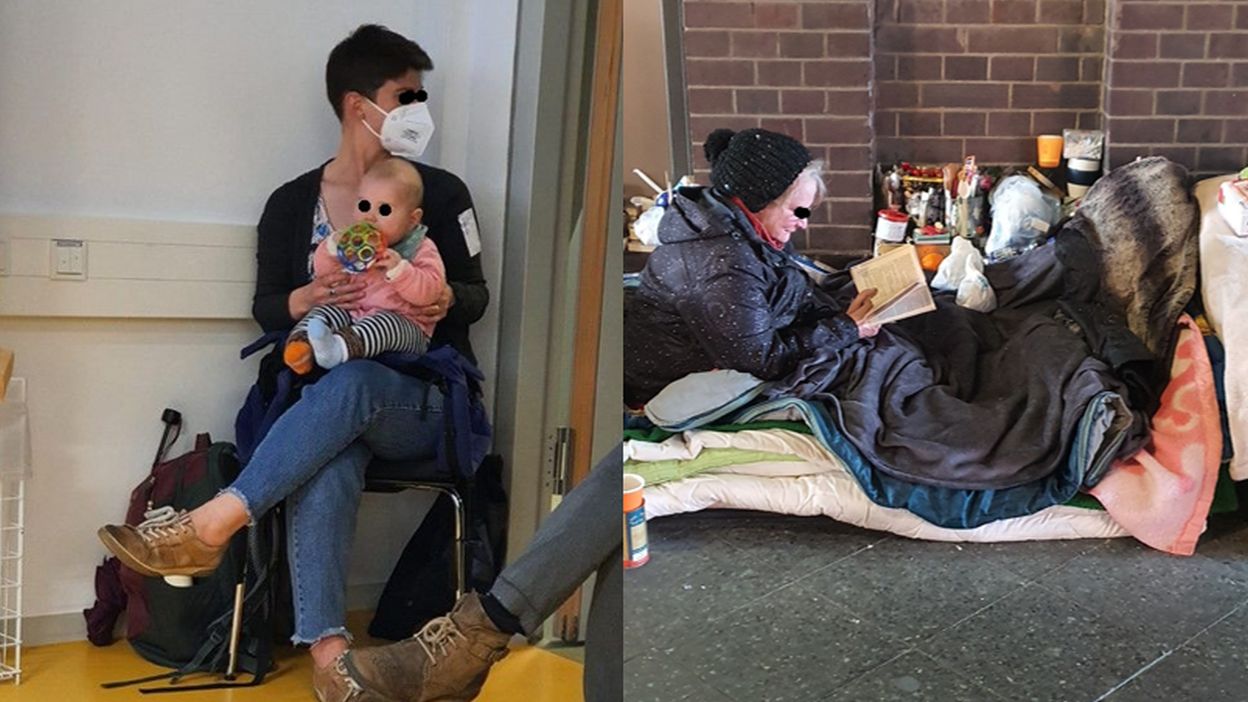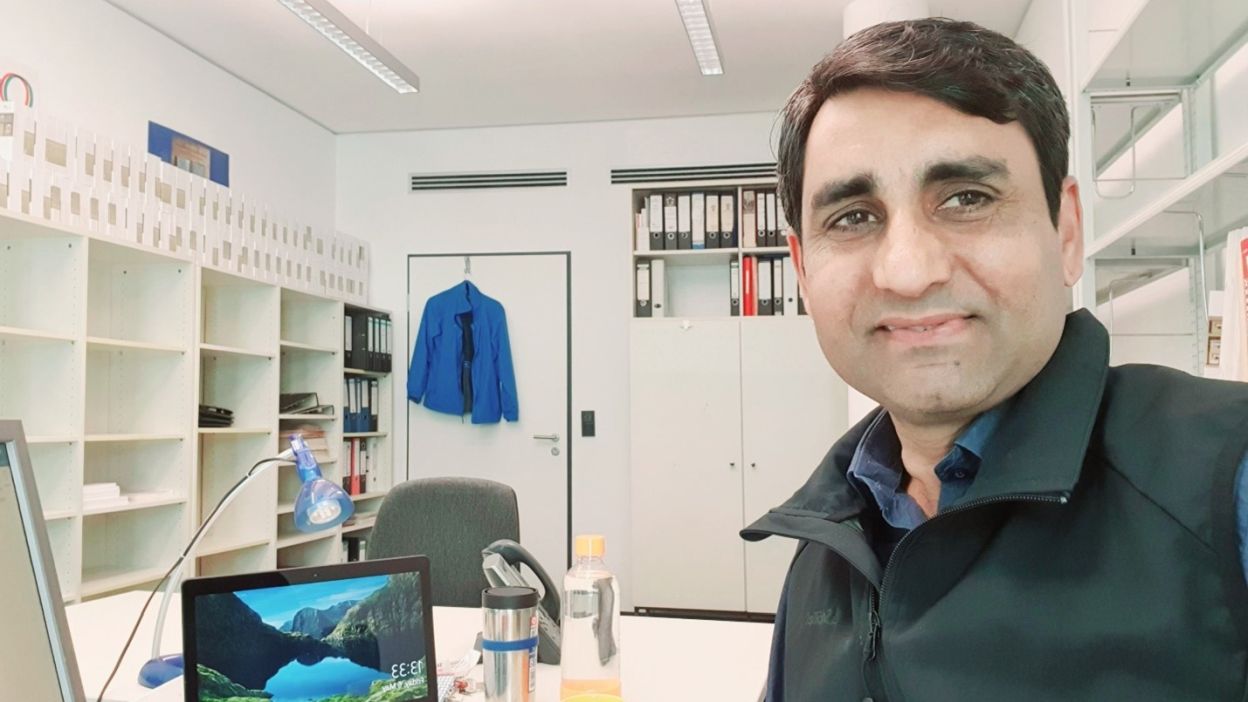Sher Muhammad
 Privat
Privat
Demonstration against the Russian invasion in Ukraine, February 27th, 2022
"Learning how to be alone and content is the most valuable lesson one might acquire in Berlin. It's not just about feeling lonely and homesick; it's also about making the most of your own time."
Through a Max G. Huber Scholarship, Sher Muhammad was able to conduct a research project at the Center for Transdisciplinary Gender Studies (ZtG) at Humboldt University in Berlin, which he complemented with many of his own experiences.
In the following, he talks about these:
I have been tempted to apply for this prestigious research fellowship by the various conferences, workshops, and short courses (six in total) I have attended in Germany prior to the commencement of the fellowship. That's why I wanted to apply for this Short Term Research Fellowship once I finished my doctorate. My research at the Center for Transdisciplinary Gender Studies (ZtG), University of Humboldt Berlin, Germany was made possible by a Max G. Huber Short Term Research Scholarship from the
DAAD-Stiftung. It makes me very happy that the academic relationship I established with PD Dr. Andrea Fleschenberg 15 years ago, when she was in Pakistan as a DAAD long term professor, has continued and even led to this research cooperation. My stay at the Center for Transdisciplinary Gender Studies (ZtG), University of Humboldt Berlin was an incredible educational opportunity for me since it provided me with access to a wealth of resources that I would not have had back in Pakistan.
My study's overarching objective was to investigate how the growing number of women in Pakistan's parliament influences the political representation of 'women's interests' during parliamentary processes (debates on draft bills / legal initiatives, either as private member bills or government bills) and legislative outcomes. For this purpose, the case study of Pakistan, one of the first countries worldwide to introduce a gender quota system, was selected to test critical mass theory for a Global South study (a desideratum in the state of the art in terms of empirical studies as well as theorizing), employing a qualitative analysis of semi-structured interviews with female legislators along with an in-depth analysis of the proceedings of three legislative periods: the 12th (2002-07), the 13th (2008-13), and the 14th (2013-18) – given the reintroduction of reserved seat provisions in 2001/2.
Sincerely, I owe a great debt of gratitude to my mentor, PD Dr. Andrea Fleschenberg, for all the advice and guidance I received at the Center for Transdisciplinary Gender Studies in Berlin. While I was employed by the ZtG, Dr. Gabriele Jähnert, Manager of the Centre for Transdisciplinary Gender Studies, was always available to answer my questions and provide guidance. My deepest gratefulness goes to Amy Visram and Claudia Kuester, who have been there for me whenever I've needed assistance or run into problems at work.
While in Berlin, I had the chance to participate in a number of international seminars and conferences in Belgium, Hungary, Paris and Italy where I presented my research. This was a fantastic opportunity to gain insight from the experience of others. As a result of this short term fellowship, a strong future scientific cooperation emerged.
While I learned a lot about German culture during my time in Berlin, there were two experiences in particular that left an indelible mark on me. Firstly, while I was attending a conference at the University of Kassel, I sat in on one of the sessions and saw a woman who was attending the session while holding her baby in her lap. This experience was literally "mind changing” and showed to me that in German educational institutions, the learning is so flexible and pleasant yet in the educational culture of my country, it seems impossible that a mother would bring her child to an international conference. This experience unfolds the importance of flexibility in learning that made it a joyful rather than a boring affair.
The second one was of an elderly lady I used to see every day on my way to the office, nodding down on the pavement just below a bridge. The intense cold didn't stop this elderly lady from reading a book while she lay under a blanket. The avid reading culture in Germany was a sight to behold.

Privat
left: Mother and baby at a conference in Kassel; right: Homeless lady reading
After Russia attacked Ukraine, thousands of people flocked to the streets of central Berlin, an event that helped elevate the country's profile. A wide range of ages participated in the demonstrations, including many families with young children. This showed a clear demonstration of the German people's aversion to war and devotion to peace.
Overall, Germany's public transportation system is excellent, and I applaud the German government for its innovative response to rising oil prices by instituting a new 9 Euro fare. It was a German service called the 9-Euro-Ticket (editor's note: https://www.bundesregierung.de/breg-de/suche/faq-9-euro-ticket-2028756; only in German), and it allowed passengers to ride local and regional trains and buses across the country for just nine euros a month. The tickets were valid for June, July, or August 2022. The offer was made in anticipation of a worldwide energy shortage in 2021–2022. I see this as the true welfare state paradigm.
Finding a place to live has been the most challenging part of moving to Berlin. To be perfectly frank, I have no idea why this is the case; nonetheless, after speaking with numerous locals, I have concluded that the main cause is the ever-increasing population of Berlin (editor's note: at that time especially because of refugees) and the consequent shortage of housing. From what I've seen, being of Asian descent can also make it difficult to settle in Berlin. I’ve had to change apartments several times, which has given me the chance to get to know people from all walks of life and professions. Living with two German women has been a highlight of my time in Germany; one of them is a journalist with an interest in Pakistani culture and politics, and we have had many lively discussions over cups of coffee in the kitchen. I'm happy that we're able to maintain this kind of relationship with one another. In addition, I used to share a house with a philosophy and German language instructor who was really concerned about the predicament that Pakistani women find themselves in. Even more, she presented me with a book as a gift. In Pakistan, such kind of lifestyle simply isn't an option. This type of housing situation has the potential to teach foreigners about German social and cultural norms and foster long-lasting friendships.
That men and women in Germany do equal amounts of housework, including cooking and cleaning, is an admirable social norm. After living in Berlin for six months, I am now in a position where I am able to cook for myself and clean my room in addition to assisting my family. This is a significant change for me as a man who comes from a South Asian society, where we depend on our female family members for cleaning and cooking.

Privat
Mr. Muhammad in his office
Living in Berlin has been difficult for me because of the loneliness I've experienced here. Learning how to be alone and content is the most valuable lesson one might acquire in Berlin. It's not just about feeling lonely and homesick; it's also about making the most of your own time. Since the city and university were both under COVID restrictions for the first two months of my stay, I spent much of my time alone. Whenever I needed to clear my head, relax down, or get rid of some negative feelings, I went for a stroll or a jog around the city.
After completing this fellowship, I was able to obtain a promotion to the position of Associate Professor, the pinnacle of academic achievement and the fulfilment of a lifelong aspiration for any research scholar.
A proposal for a special journal issue on “Asian Women Parliamentarians Swimming against the Tides of Political Ruptures, (Post-) Conflict, and Authoritarianisms” (working title), was developed during my time at Center for Transdisciplinary Gender Studies (ZtG). Having completed the proposal for my role as Guest Editor alongside PD Dr. Andrea Fleschenberg and Ella Prihatini, PhD, Lecturer, Binus University, Indonesia, I intend to return to Berlin this summer to complete the task, which will contribute greatly to the existing body of knowledge on women's political representation in Asia.
My research would not have been feasible without the generosity of Mr. Huber's family. I tried to visit the Huber family in person to express my thankfulness, but unfortunately was unable to do so. However, I am grateful to Stefanie Lohmann of the DAAD-Stiftung, who sent a gift I had brought from Pakistan to the family. I owe a great debt of gratitude to Mr. Huber's family, who provided the financial support that made my trip to Humboldt University of Berlin possible.
In the journal "International Quarterly for Asian Studies (IAQ)" is a book review by Mr. Sher Muhammad on the volume Substantive Representation of Women in Asian Parliaments edited by Devin K. Joshi und Christian Echle.
Editor's Note: The DAAD-Stiftung is honored that one of its scholars with such a special field of research gives a unique individual insight into his scientific and personal impressions.
As of December 2022.


